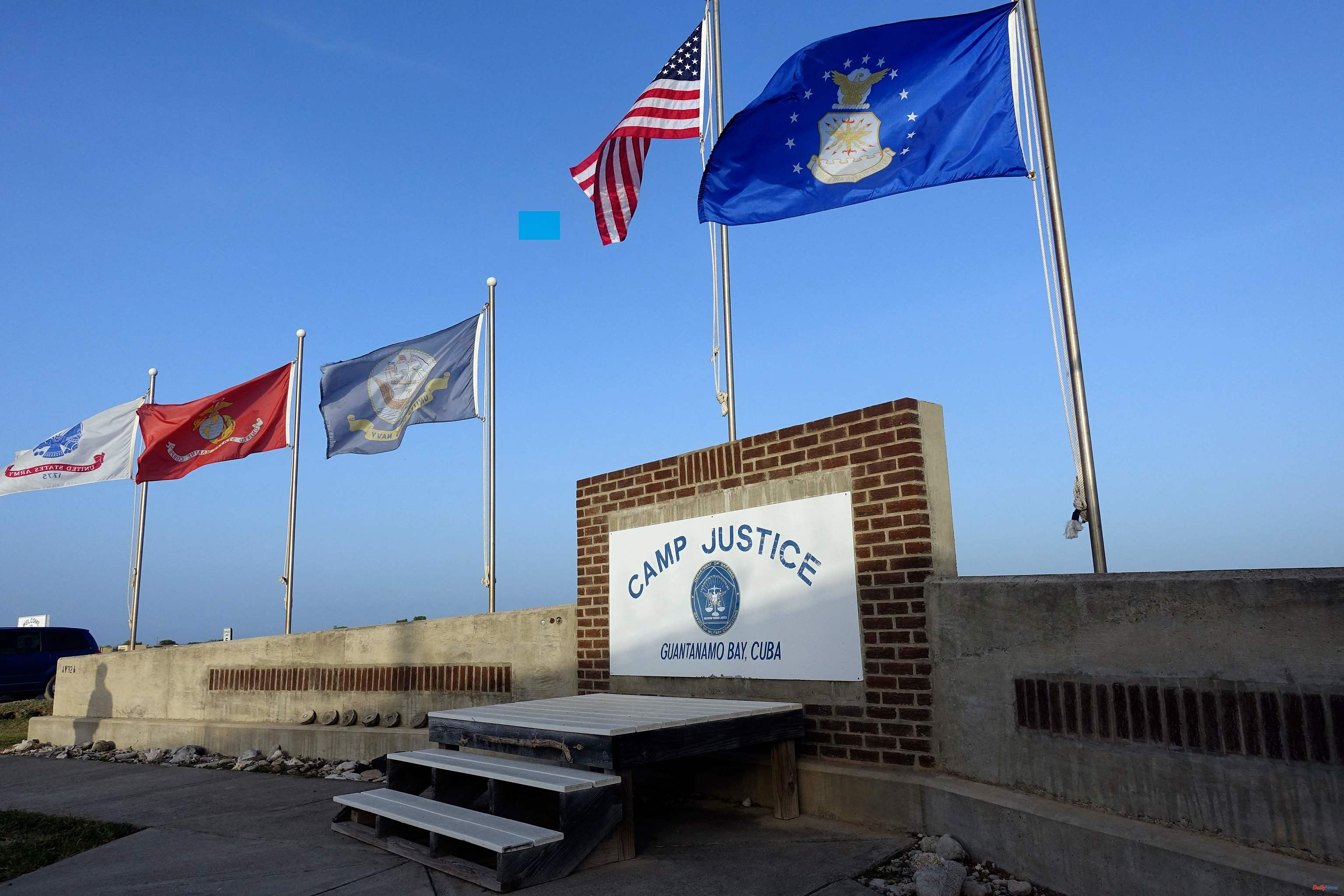Majid Khan regained his freedom almost 20 years after being arrested by the US on March 5, 2003 in the Pakistani city of Karachi accused of being linked to the mastermind of the September 11, 2001 attacks in New York, Khalid Sheikh Mohammed. The US authorities transferred him to Belize on Thursday from the Guantánamo prison in Cuba, where he was held for 16 of the 26 years to which he was sentenced in 2021 after pleading guilty to helping Al Qaeda in 2002.
Khan, born in Saudi Arabia and with Pakistani citizenship, became famous for being the first detainee after the attacks on the twin towers to publicly denounce before a military court that he had been tortured during the three years he was confined in different secret prisons in the CIA that functioned within the framework of the 'war against terrorism' declared by the US. Thus, after his arrest, Khan, who is now 42 years old, was transferred from one country to another between 2003 and 2006 to clandestine prisons in Pakistan and Afghanistan where he suffered torture to extract information after being considered a "high value" detainee.
In 2012, he admitted in a plea deal that he participated in a plot with Khalid Sheikh Mohammed to assassinate then-President of Pakistan Pervez Musharraf with a suicide vest and act as a courier to send Al Qaeda US$50,000, in order to finance a bomb attack on the Marriot hotel in Jakarta, Indonesia in August 2003. As part of that agreement and one day before being sentenced, he read his 39-page testimony before a jury of eight US military officers, thus becoming the October 28, 2021 in the first prisoner in Guantanamo to have details of the torture to which he was subjected by CIA interrogators. According to what he recounted, in unidentified countries, he was hooded and suffered enemas and simulated drowning, while he spent entire days chained and even sometimes hanging by chains, without food or clothing, in dark cells with loud music and guards spraying him. with ice water.
He also revealed that his torturers from the US intelligence agency beat and raped him repeatedly, to the point of forced anal feeding and even inserted a hose into his rectum, supposedly to rehydrate him. "I thought I was dying and I begged them to stop," he revealed to the military court, to which he explained that "every time they tortured me, I told them what they expected to hear. I lied to them so that the abuses would end, however, the more I cooperated and I told them, the more they tortured me". At the same time, he denounced that his torturers also threatened to harm his family in the United States and to rape his sister. "I lost my sense of reality" and came to hallucinate seeing "images of a cow and a giant lizard" because he spent several days deprived of sleep. He also recounted that at the beginning of his detention his glasses broke, without which he said that he is almost blind, although it took almost three years to give him new ones.
After finishing his unprecedented statement, seven of the eight members of the military jury described the treatment suffered by Khan as a "blemish on the moral strength of the United States." In this sense, they criticized that he "was subjected to physical and psychological abuse far beyond the approved enhanced interrogation techniques, which are closer to the torture carried out by the most abusive regimes in modern history." In addition, the military recognized that the abuses practiced against the prisoner "did not have any practical value, in terms of intelligence or any other tangible benefit for US interests." In addition, the testimony of the confessed terrorist is supported by an investigation by the US Senate Intelligence Committee into the use of torture by the CIA after the attacks of September 11, 2011 in New York and the Pentagon, which was published in December 2014. In this 550-page report, the CIA was directly accused of committing abuses against Al Qaeda prisoners far beyond its legal limits and of giving the public false accounts of interrogations conducted in the secret prisons.
Pursuant to the plea agreement, his release was scheduled for February 2022 and no later than February 2025, although it did not come true until Thursday in Belize, thanks to a collaboration agreement between the Joe Biden Administration and the Caribbean country that borders Guatemala and Mexico.
Khan was born in Saudi Arabia in February 1980, but grew up in Pakistan from where he immigrated to the US when he was 16 and in 1998 his family was granted asylum, making him the only Guantánamo prisoner with legal US residence. He attended a Baltimore, Maryland, college where he graduated and on a 2002 trip to Pakistan to find a woman to marry, he was recruited as an al Qaeda collaborator by some relatives. After collaborating with the jihadist group, the day he was sentenced he showed his rejection of both Al Qaeda and terrorism, while he forgave those who tortured him.
As soon as he was released from Guantánamo, where he had remained since September 2006, Majid Khan wrote a letter published by his legal team in which he stressed that "I have been given a second chance in life and I intend to make the most of it." On the other hand, he "deeply" regrets the things he did many years ago and asks "forgiveness" to the people he has hurt. Thus, he shows his "sincere regret" and stresses that, just as the world has changed a lot in 20 years, so has he, for which he promises the people of Belize that they will be "a productive and respectful member of society law", so "I will not let them down".
Khan says that when he was captured and made to disappear into CIA clandestine centers 20 years ago, he thought his life "was over" as he was sure "I would never be free or see my family again." Thus, he recalls that "nobody knew where he was, nor what had happened to me, not even if he was alive", because he was a "ghost and a walking dead".
He denounces that when he was tortured, "I often wished for death to escape the terror and pain, but I did not die and I am a survivor." In this way, he adds that "I feel that I was reborn and have become part of the world again" because "I am starting a new life in a new country and a new culture." Likewise, he points out that he will soon be able to see his daughter for the first time, who was born after her capture, and will be reunited with his wife and family, for which he admits to being "nervous, but also excited ". Finally, he announces his intention to start a real estate business "or maybe a restaurant or food truck business because I would love to introduce Pakistani food to everyone in my new country."
For his part, lawyer from the Wells Dixon Center for Constitutional Rights, who has represented Khan since his arrival at Guantanamo in September 2006, stressed that his client's transfer to Belize is the "culmination of decades of litigation to combat the worst abuses of the 'war on terrorism' started by former President George Bush and closing the Guantánamo Bay prison", where 34 detained men still remain out of the almost 800 that it has come to house since it was set up in 2002, the Most of them were captured in Afghanistan during the US invasion of that country after the 9/11 attacks.
Meanwhile, Katya Jestin, also a lawyer, described Guantánamo as a "national shame", for which she hoped that today will be "another step towards its final closure", since indefinite detention is "abominable for a just society". . Khan has become the sixth detainee transferred by the Biden administration and the third to be resettled in a third country. According to the US press, which quotes two senior officials from that country, the government is preparing to transfer at least two more prisoners in the coming weeks, although the country to which they will be sent is still unknown.
The UN special rapporteur for the protection of human rights in the fight against terrorism, Fionnuala Ní Aoláin, of Irish origin, will visit Guantánamo between February 6 and 14 at the invitation of the Joe Biden government, 21 years after that this US naval base, located in the south of Cuba, would become a prison for suspected Islamist terrorists. A group of UN human rights experts said in a statement last year that between 2002 and 2021 nine detainees died in that prison, two of natural causes, while seven had committed suicide without charges being filed against any of them. .
This will be the first time that a UN delegation will visit these facilities from where some prisoners have been released in recent years, while others have been relocated to third countries or repatriated to their countries of origin, with a minority being tried. and condemned. In the next three months, Ní Aoláin plans to interview the victims of the terrorist attacks of September 11, 2001, as well as former detainees at Guantánamo.
According to the criteria of The Trust Project












